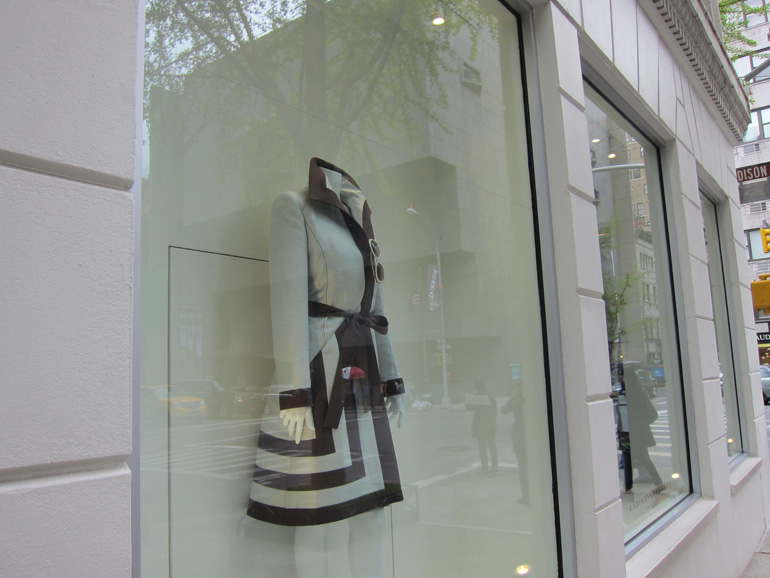Weekend Note:
Alone
4 May 2012
Friday
Kathleen has just left. She’s going to spend the weekend with her father in Durham. She’ll be back on Sunday. My own plans for the weekend are simple: I’ll see a movie this afternoon and then sit with Will while his parents go out to dinner; and, tomorrow afternoon, I’ll have a look at the pre-dynastic installation in the Egyptian galleries at the Museum. I think that I’ll be able to manage that. It’s hard to think very clearly this morning. We had a thunderstorm, about an hour ago. For the third day, the sky is leaden and the air is neither wintry nor warm, but uncomfortably indifferent.
It’s a good weekend for digesting the altera pars of Alison Bechdel, Are You My Mother? I’ve just pulled down Fun Home, the “family tragicomic” that came out, astonishingly, six years ago (that long!). It’s shorter, it’s more roughly drawn, and it’s a much simpler, more straightforward read — as would befit comparisons between a book about a father and a book about a mother. Most of yesterday afternoon went to Are You My Mother? I read it in about three sittings, almost breathlessly, trying to keep track of the constantly-shifting time frame and to absorb all the ideas of Donald Winnicott that serve as a kind of ground-bass to the story. Then I got to the last box. “She has given me the way out.” I felt a shocking discharge; the tears popped out of my eyes and I gasped for breath. There was nothing intrinsically surprising about this last line; it simply culminated everything that went before. Everything. It was the way out of the book, too, of course: “this way to the egress.”
The Bechdel family saga involves an openly homosexual daughter and a closeted homosexual father, but it doesn’t stop there. What, exactly, is the problem between Alison and her mother, Helen? Growing up, Alison found her mother to be distant, and as an adult she came to wish that her mother were more interested in her life — more prying, even. What wounds and dissatisfactions held Helen back? I don’t think that she will ever tell us; she’s on record in this book as holding memoir (as a literary form) in contempt. But perhaps there is no need for a memoir, if Helen can say, in one memorable outburst, “I regret that I wasn’t Helen Vendler.” What doesn’t that tell us?
I came away from the first reading persuaded that mother and daughter were literary rivals in much the same way that a father and a son might be, and that the mother quite beautifully managed her side of the rivalry by staying out of her daughter’s way. Bad mothering, perhaps (inadequate, certainly), but, as the book says at the end, “the way out.” The mother-daughter connection, qua female, was something of a red herring, particularly as the two women never competed sexually. There was a hole in Alison’s infancy — when she was about three months old, her mother became pregnant again, and Helen always made more of her two boys — and much of Are You My Mother? is an analysis — a psychoanalysis — of that gap and how the adult Bechdel dealt with it. The book is so good — The Pain Recaptured would have made a good title — that it is easy to overlook the obvious: mother and daughter were (are) both serious writers. Helen Bechdel isn’t Helen Vendler, and Alison Bechdel tells stories graphically, but they are still, both of them, intellectual hunters after truth. I don’t know anything about the brothers, but the evidence suggests that Helen and Alison are the men in the family.Â
***
Among my more egregious sins, lately, I’ve been failing to write up the movies that I see. The Five-Year Engagement is a marvelous picture that deserves nothing less than hosannas; perhaps I’ll get to it on Sunday. Perhaps I’ll see it again, in the theatres, with Kathleen (not very likely before our trip to Amsterdam, though). Today, I saw a film that elicited a very different response, but as it won’t take long to state it I’ll jump in even though it’s nearly ten and I’ve just had a good time with Will, if you know what I mean. (Which you don’t unless you’re my age. He was an angel, but he did order me around a bit.) I think that it’s better to write about Damsels in Distress late in the evening than early in the morning, when I have more energy.
I was disappointed, first by the production values and then by the story, such as it was. I’m all for making movies on the cheap, but I’m not a fan of cheap-looking movies, and there were moments in Damsels that reminded me of the educational filmstrips that we used to have sit through in Sixties auditoriums. The visuals were not crisp and the sound took some getting used to. It was a long, long way from Barcelona.
The story makes sense only as an undergraduate project. If Whit Stillman were to tell me that he’d pulled a scenario out of a college trunk, I’d have thought, exactly. The point of view was the kind of muddle that’s inevitable when you think (as some sophomores really do) that everything you do is très cool. It was almost, but not quite, a train wreck. Is Damsels a satire of upscale dimwits loitering in the Groves of Academe, or is it merely set there, like Too Many Girls and My Lucky Star? The entire dancing business, all of it, was strange at best and just wrong most of the time. (If only the Sambola had been a dance sensation!) And I was less and less sure about Greta Gerwig’s character as the movie progressed; by the end, I was thinking that Payne Whitney might be the place for her. There were lots of good things in the movie (Analeigh Tipton, Ryan Metcalf, and Megalyn Echikunwoke all deserved more time in the spotlight). But they didn’t cohere, so they couldn’t offset the terrible things in the movie (the Cathars! the Roman Holidays!). There were too many fizzled plotlines (it would have been better with no professors, and the whole Daily Complainer line was hardly more salvageable than the dancing), all of them more engaging than they would have been with a strong central plot.
The worst of it was this awful fear, that Whit Stillman never saw Mean Girls.
Nevertheless, I recommend Damsels in Distress, partly out of class loyalty (I’ll be honest) and partly out of class treason. I don’t know how I’m going to feel about it the second time around. There will be a second viewing; there almost always is. Question is: will there be a third?
Saturday
What a glorious evening I’ve just had. It’s my new model for a night out on the town. First of all: not a “night”; it’s not even ten, and here I am at the keyboard. The second thing is that I would have had an even better time if Kathleen had been with us, because then, of course, we could talk all night about everything that we learned.
At four o’clock, I met up with Marc LeBlanc, Ms NOLA’s brother, a very nice guy who also happens to be a credentialed Egyptologist (PhD Yale, 2011). He conducted me through the Metropolitan Museum of Art’s installation of pre-dynastic objects, at the bottom of the Lehman Wing. The fact that I had never given such objects much of a thought made the visit what we used to call “a trip.”
“Pre-dynastic,” it occurred to me on the walk home from dinner, is not the way to put it. “Ante-dynastic” is, as in “ante-bellum,” the phrase that used to denote life in the United States between Jackson and the Civil War. The culture of Egypt before unification under the pharoahs (Marc is rigorous about speaking of “kings”) was not erased by what came later; it was simply developed. Certain things were dropped, such as the “bird dance,” or whatever it was that was signified by the representation of a female profile (none too hippy or busty, by the bye) raising her arms over her head in a heart-shaped manner, fingers pointing down. Some scholars believe that the gesture is meant to suggest the horns of a heifer, but Marc is not persuaded by this theory; he thinks that a bird is the object of imitation. I was inclined to agree, but the uncertainty is not without its appeal. There is always much to be learned.
Other things, such as boats, became fixtures of Egyptness. Also, palm trees and chorus lines of ostriches. (Well, chorus lines.) The objects at the Museum begin by looking generically “archeological”; hippopotamuses (all of whom look pretty much like Tiger in Kipper) are the only Egyptian cue. Then human figures appear. A few cases on, and you get to the palettes. The palettes are ceremonial inkstones, as it were, for the preparation of ceremonial makeup; the working center of each palette is a perfectly rimmed circle in which the cosmetics were ground. I think that we’re talking about make-up for men here: men for whom the difference between hunting, religion, and warfare did not exist. I hope to write more about the palettes after further visits; I’ve never seen anything like them, and they are not only fascinating but brilliantly executed. Marc can’t have imagined how far I was from being bored by his explication. If I slowed down now and then, it was only because I was soaking everything up. I saw serekhs everywhere, especially before I knew how to spell them. (A serekh is the royal insignia, inscribed in a square and topped by a falcon. Literally, the square part of a serekh is the wall of a king’s palace.) I was more disappointed by the end of new things to look at than I have ever been in my life. I was just getting started!
So I asked Marc to take me through the Egyptian Wing itself, the part of the Museum that I know least well. I’m glad that I’d waited for this particular guided tour, because it was as though someone (namely Marc) were saying, “And all of this is just down the street from your house, too.” Here’s one great thing that I learned. By the time of Rameses II (I’m spelling it the old way, I think), the ancient Egypt that I’d discovered at the pre-dynastic show was already ancient Egypt! It was already thousands of years old, more or less, and ripe for rediscovery and retooling. Retooling? We’ll talk about Amenhotep III’s Colonial Williamsburg ball some other time. In the Great Hall of the Museum, right in front of the Membership desk, there stands a great granitic statue of Amenemhat II (1929-1895 BCE), from Berlin. Thing is, the cartouches — the rounded lozenges in which the king’s name is inscribed — say “Ramses II.” And why not, Rameses, or Ramesses, okay (watch out, or I’ll call him “Ramsay”), was a Very Great King (1303-1213) in whom I have always had a close interest, because, like me, he suffered from ankylosing spondylitis — even if Wikipedia says he didn’t. But forget about that; the point is that, even in Egypt, nothing was sacred. I joshed with Marc about it. I said that the reinscription may have been effected without royal directive. Maybe Ramesses was on a tour, and the good folks in Thebes wanted to welcome him warmly. “What have we got?” said the mayor to his minions. I realize that this is sounding more Preston Sturges than Dio Cassio. But I will tell you this. By the time we got to the statue in the Great Hall, I would have recognized Ramses’s cartouche anywhere. (And it is all over Amenemhat, the poor sod.)
We were on the point of leaving the Museum for dinner when I asked Marc if there was anything that he wanted to see. The upshot of that was that we went up to the Irving Galleries in the Asia Wing, which are more often closed than not. I wished that I could have told him more about the luohans, but we liked them well enough without my blather.
After that, we had a good dinner at Demarchelier — after which it was great to walk outside into the cool evening. Marc persuaded me (without trying) that I really have to see The Wire. Walking down 86th Street in the middle of the Saturday night, I felt that I was having as great a time as anybody. And I still do, except that now I’ve done the writing and must be prepared for the edits. Better edits than smitings!
Sunday
Last Saturday, when I headed downtown for Ray Soleil’s party, I left Kathleen in bed, weeding through her emails. I also left a playlist running. The next day, she told me what a pleasure it had been to listen the music through the afternoon and into the evening — it stopped only shortly before I came home. I could not have been more pleased. I had compiled the playlist for weekend lazing, which is to say with a firm awareness of what Kathleen would like to listen to and what she wouldn’t, and it was great to know that I had accomplished just that. She thanked me, which was the most unlooked-for pleasure. Not Kathleen’s thanking me, but thanking me for the music.
Compiling another playlist this afternoon (this one built around Handel’s two sets of keyboard suites) I’m remembering how awful it used to be —I used to be — when I’d play records for friends. “Oh, you must hear this.” “Wait, there’s something else that you’ve just got to hear!” “This will only take a second; it’s very short.” “I thought it was this cut; it must be the next one.” How good people were, on the whole, to put up with such torture. Now, I’m absolutely mystified by the need that I had to make other people hear the music that I happened to be crazy about. I have lost the urge to “share.” And I don’t “play records” anymore. I can’t underline sharply enough how the act of listening to music at home has been transformed by these vast iTunes playlists that I’ve been putting together for five years.
***
Having stayed up late last night — I watched the outstanding Charlize Theron in Young Adult, and would have perished of sympathetic mortification if I hadn’t been too tired for strong feelings — I slept in this morning, getting up at ten, breakfasting at half-past noon, and getting dressed quite indecently late. After spending a few hours with the Times, I picked up The Turn of the Screw and read as much as I could before the pot of rich, dark coffee that I’d drunk made it impossible to continue. Kathleen flies home this evening; she’ll have had an early dinner with her father and brother before boarding the plane. I’m thinking of watching a movie that I’ve never heard of.
***
And the question is, why haven’t, or hadn’t, I heard of Stephen Poliakoff’s Glorious 39? Or, for the matter of that, Stephen Poliakoff? He seems to be a one-man TV industry in Britain, and Glorious 39 is the sort of movie that you’d expect American Anglophiles to gobble right up. Imagine: Brideshead Revisited meets Remains of the Day, with a dash of Atonement. The cast includes Julie Christie and Bill Nighy, also Jeremy Northam, Eddie Redmayne, and Juno Temple. Romola Garai is the star. She plays the adopted daughter of a very grand family, from which she is cut apart by the discovery of its participation in an aristocratic attempt to steer the UK toward surrender to Hitler — a conspiracy that is not shy of murder. I forgot Notorious — there’s more of a dash of that in Glorious 39. Hitchcock is definitely in the air. (I also forgot to mention Hugh Bonneville, who, with Charlie Cox, is one of at least two Downton Abbey stars on hand.) Melodramatic and gorgeous at the same time, Glorious 39 is perhaps a tad sententious, but it kept me on the edge of my seat just the same. When I ordered it, from Amazuke, I prepared myself for something awful, because otherwise there’s no explaining why the picture wasn’t shown and isn’t known over here. Or perhaps I’ve just had another one of my senior moments, and everyone knows all about it. Â

















